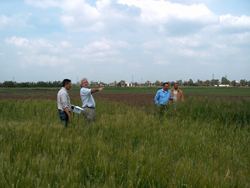Revisiting crop basics
Water Usage Effectiveness (WUE) and Nitrogen Use Efficiency (NUE) are important factors in managing crops more cost effectively and in a more environment friendly way. This is because water and nitrogen are the main limiting elements in the Mediterranean area for these crops. The EU-funded 'Management improvements of WUE and NUE of Mediterranean strategic crops (Wheat and Barley)' project (Watnitmed) was conducted over four years. The purpose was to improve understanding of water and nitrogen use in wheat and barley crops and to identify better methods for capturing and effectively exploiting these limited resources in order to make farms more efficient and facilitate genetic fine-tuning of crops. By understanding how crops respond to water and nitrogen shortages, the project aimed to design better management systems. It considered the crops' capacity to capture and use water under different nitrogen conditions, as well as capacity to capture and use nitrogen in different water availability situations. The work began by assessing variances of water and nitrogen as crop limiting factors in the Mediterranean basin, including root capture, leaf photosynthesis and grain number. The crop simulation model led to new ideas on innovative management strategies, combined with evaluation of alternative management schemes that improve capture and efficient use of the two compounds. Overall the project analysed hypothetical crop management strategies to advance cereal cultivation around the Mediterranean region, evaluating the socioeconomic impact of these proposals including a pilot study in Tunisia. It also distributed relevant information on the subject to stakeholders through workshops, presentations and a regularly updated project website. Most importantly, it disseminated key information to farmers in order to jumpstart the initiative and help produce better crops.







